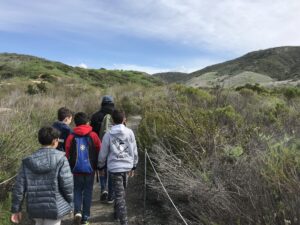The Conservancy’s STEM (Science, Technology, Engineering, Mathematics) education programs immerse students and the public in environmental research at Crystal Cove State Park. By taking part in conservation research projects and helping to further our understanding of how Crystal Cove is changing over time, participants develop the science skills they’ll need to become our community’s next generation of environmental leaders, ensuring that Crystal Cove, and all places like it, will be protected for years to come.
Our Approach to STEM Education

Our educational programs leverage a close partnership with California State Parks and UC Irvine in order to connect classroom learning to real-world investigations. Students who participate in our programs work alongside State Park managers and university scientists to analyze and solve real-world conservation problems. During our programs, students head to sea aboard a fishing vessel to monitor the Crystal Cove State Marine Conservation Area, explore coastal engineering concepts as they measure sand deposition and construct computer models to show beach change, and work alongside scientists to investigate the best way to help native seedlings grow.
A highlight of our programs is a field trip to the park to explore its unique ecosystems and gather scientific data, but these programs are more than field trips. Park excursions are part of an extensive STEM learning curriculum that contains as many as twenty in-class lesson plans and hours of real engagement in the scientific process. We partner with researchers from UC Irvine’s School of Education to ensure that our programs align with best practices for science education and incorporate high-level science skills such as designing models, engaging in evidence-based reasoning, applying computational thinking, and constructing explanations.
Participating teachers also receive professional development designed to increase their effectiveness in meeting rigorous Next Generation Science Standards and empowering their students to become active science learners.
Learn more about the three focus areas of our educational programs:
Our Participants

Because The Conservancy holds diversity and inclusion as one of our highest tenets, we intentionally partner with schools in disadvantaged communities – in fact, nearly three-quarters of our students come from our most underserved Title 1 schools. Our commitment to diversity and inclusion is grounded in our aim to address the historical exclusion of Black, Indigenous, & People of Color from public lands, protected waters and the environmental cause itself. Because these communities have had limited access to natural spaces, they continue to be excluded and underrepresented in the science initiatives which aim to protect such lands and waters.
Each year, more than 10,000 students participate in our programs, developing an understanding of the importance of environmental stewardship, applying the scientific process to explore ecological questions, and proposing meaningful interventions to help protect the park’s natural ecosystems while building real bonds with the natural world. Our partners and donors help us ensure that we can provide these life-changing experiences at no cost to participants.
Distance Learning During COVID-19
The novel coronavirus has created a critical pedagogic hole in the traditional methods of delivering K-12 education, and our distance learning programs are designed to remediate its impact. When the pandemic first hit, our education team began adapting our existing curriculum for distance learning. All of our programs are available in a hybrid format, integrating video conferencing sessions in place of traditional field trips and redesigning investigations to increase their flexibility, so that learning can take place at home or in the classroom.
Our distance learning programs are different from other existing online science modules because they maintain our commitment to real-world connections, challenging students to analyze real-world data and apply their knowledge to help solve environmental problems at Crystal Cove State Park. Like our in-person field trips, the distance learning programs focus on topics like marine conservation, ecological restoration, and the effects of coastal change on Crystal Cove’s beach.
All of this is offered to participants at no cost. Whether you’re a teacher struggling to navigate the new realities of learning during COVID-19, a new homeschool group trying to make real-world connections, or just a future scientist who loves to learn, we’d love to have you join us.
If you’d like to get involved or have questions about upcoming educational programs or teacher/educator workshops and resources, please feel free to contact our team:
| Sara Ludovise Vice President, Programs sara@crystalcove.org |
Holly Fletcher Education Manager holly@crystalcove.org |
Kaitlin Magliano Education Manager kaitlin@crystalcove.org |
